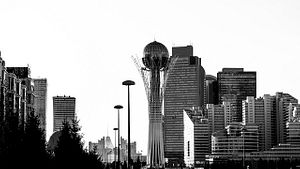As Kazakhstan reimposes a lockdown due to a spike in COVID-19 cases, mild hysteria spreads on social media. With an increasing number of people falling ill with what is not always confirmed to be the coronavirus (deaths are reported to be resulting from pneumonia without further information on what causes the lung infection), social media has seen an influx of misinformation. Bloggers flood social media news feeds with conspiracies; meanwhile fake treatment regimes, unsupported by the WHO, circulate on instant messaging platforms, promising full recovery from the disease.
In early July, photos of contrails, streaks of white left by planes in the sky, emerged on Instagram and Facebook. Bloggers posted pictures of trails that were witnessed by Kazakhstanis around the country. Unsure about the origins of the trails, guesses and conspiracy theories spread quickly. With the help of social media, conspiracy theories were spread through posts which claimed that the prints in the sky are a result the chemical beryllium left by the planes on purpose (a Kazakh version of the notorious chemtrail conspiracy). Some assumed these could be the reason for the increasing number of respiratory diseases, and numerous commentaries on social media suggested the government was “poisoning” people. Spam messages calling people to stay at home and a suspiciously-sourced video supporting the conspiracy theory began circulating on WhatsApp. Bloggers further shared video footage of machines spraying a substance at late hours in the streets of Almaty.
These wild theories were all misplaced panic. Suspicions of “poisoning” in Almaty stemmed from what later was confirmed by Almaty’s city council to be a regular tree pest and fungus disinfection routine. The conspiracy theory around the contrails in the sky was concluded to be fake by Factcheck.kz, an independent fact-checking service. The trails were reported to be nothing but a typical “condensation trail” (a contrail) that is left behind by planes. The intensity and persistence of a specific trail might vary depending on climate conditions and the altitude of the plane’s route.
These conspiracy theories followed earlier misinformation campaigns which confused people. Earlier this year a number of “social media influencers” launched a large country-wide campaign against mandatory vaccination of children. A petition produced by these activists was claim-checked by Factcheck.kz, which reported that it heavily relied on manipulative and false statements about vaccines and vaccination that have little scientific validity.
The jump in COVID and pneumonia cases resulted in drug shortages that further facilitated flows of manipulated and false information about treatments. Enormous queues at pharmacies were formed by people trying to buy nearly non-available antibiotics, antipyretics and thermometers. Paracetamol was out of stock after a few days. While the government keeps promising it will satisfy demand, a severe shortage is still apparent. Since hospitals are overloaded, people are attempting to self-treat and seek remedies elsewhere. A “protocol” articulating guidelines on a “COVID therapy” has been spreading around on instant messaging platforms. The “protocol” in question was supposedly produced by the Ministry of Health of Russian Federation. Factcheck.kz conducted an investigation and argued that the “protocol” was a fake and had little to do with the Ministry’s official recommendations. More traditional home remedies have circulated, too. A WhatsApp message has been spreading that claims mutton fat can help in the fight against COVID-19. The recipe advises to mix processed fat with honey and shredded ginger and to consume it, as well as to rub the body with it. Fact-checking and common sense suggests there is no reported evidence of the effectivity of such a “treatment” while WHO advises decreasing the consumption of animal fats amid the pandemic.
Unfortunately, fake news and misinformation tend to spread quicker than trustworthy news, so argues noted economist Sergei Guriev. Manipulated information goes against conventional wisdom and widely accepted facts, hence, it is more appealing to share and pass around, he says. This is especially the case in times of uncertainty such as during the COVID pandemic. Since there is no wide consensus about treatment methods for COVID-19, desperate people who get the virus fall victim of misinformation and fakes in desperation. However, there are digital initiatives by volunteers with expertise to provide informational support in times of uncertainty. Medsupportkz shares properly sourced information on COVID treatments, while True Story KZ posts up-to-date statistics. There is also an official digital support center as well as a grassroots support group that helps to spread the word and aid those who are in urgent need of medication.
Praised for its quick response to COVID back in the spring, Kazakhstan has been lambasted this summer for its return to lockdown. Even elbasy, Kazakhstan’s First President Nursultan Nazarbayev, contracted the virus. The public was further riled by fireworks marking the celebration of Capital City Day on July 6, a day after the second lockdown began, which also happened to be Nazarbayev’s birthday. Social media exploded with commentary, with many considering the fireworks show disrespectful in light of growing daily case and death totals. Many pointed to the need for smarter investments into medicine at the moment, not entertainment. Some mentioned the British monarch Queen Elizabeth’s gesture cancelling fireworks usually set for her birthday back in April due to the pandemic, she said it was the right thing to do.
While pharmacies are running short on medicines and hospital facilities cannot accommodate all the ill, misinformation and fake news do nothing but intensify panic.
But a lack of media freedom — and the low degree of media literacy such circumstances generate — means it is harder than ever for Kazkah citizens to smartly navigate the information available, often landing themselves at uncertified sources.
Anastassiya Fershtey is a graduate student at the University of Glasgow. She specializes in social developments in Eastern Europe and Central Asia.

































